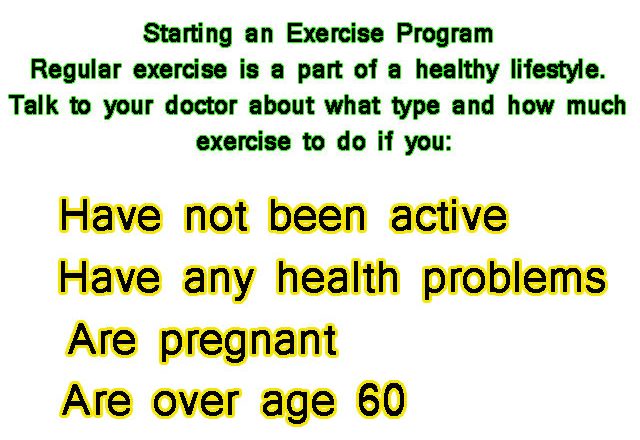• Have not been active
• Have any health problems
• Are pregnant
• Are over age 60
The goal is to exercise 4 to 6 days each week. Exercise for 30 to 60 minutes each time. To prevent injury, slowly increase the number of days and the amount of time you spend exercising.
Regular Exercise Helps to :
• Improve how well your heart and lungs work
• Maintain a healthy weight or help you lose weight
• Improve balance, muscle tone and joint flexibility
• Relieve stress and tension and improve your mood
• Reduce the risk of heart disease, high blood pressure, osteoporosis
and diabetes
Getting Started
• Choose an exercise you like to do.
Try to vary the type of exercise you do to increase the health benefits
and prevent boredom and injury.
Types of Exercise:
Aerobic exercises move large muscles and improve the health of your heart and lungs. Examples include walking, jogging, aerobic classes, bicycling, swimming, tennis and dancing. Walking is a good choice for beginners. You only need a good pair of athletic shoes. Walking can burn as many calories as jogging without the high impact on your joints. Walking is good for your heart and lungs and helps prevent osteoporosis.
Strength training exercises
Strengthen muscles and build strong bones. Using weights, exercise bands, other weight lifting equipment, and doing push-ups and sit-ups are examples of strength training. Talk to your doctor before beginning strength training if you have high blood pressure or other health problems.
Flexibility exercises
Also called stretching, increase the length of muscles to improve balance and joint health. Stretching is important before and after exercising and as an exercise itself. Examples include yoga and tai chi.
Begin and end an exercise session with 5 minutes of gentle exercise or stretching. For example, walk 5 minutes before and after jogging. This will help prevent injury. • Exercise at a comfortable pace. Listen to your body. You are exercising too hard if you: f Have pain in your joints, feet, ankles or legs f Have problems breathing f Feel weak, faint or dizzy during or after exercising.
Stop exercising and call your doctor : Pain or pressure in your chest, left neck, shoulder or arm f Sudden dizziness f Cold sweat f Pallor f Fainting

